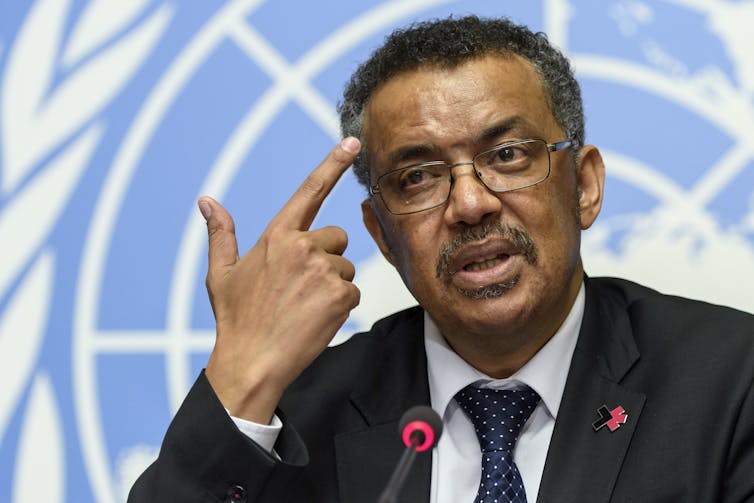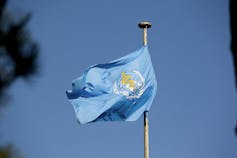WHO backtracked on appointing Mugabe as their goodwill ambassador.
At an international conference on non-communicable diseases, Tedros Adhanom Ghebreyesus, the World Health Organisation director general, recently named Zimbabwe president, Robert Mugabe, as a new WHO “goodwill ambassador” on non-communicable diseases (NCDs) for Africa. Following international uproar the accolade was rescinded – but the debacle showed both misguided good intention and the importance of internal communication.
Ghebreyesus (or Tedros, as he likes to be known) was elected to lead the WHO in May. He has a strong record of global health leadership, having previously served as chair of the board for the Global Fund to Fight AIDS, Tuberculosis, and Malaria, the Roll Back Malaria Partnership, and co-chair of the Partnership for Maternal, Newborn and Child Health. From 2005-2012 he served as Ethiopia’s minister of health, winning plaudits for reforming the health system, improving outcomes, and widening access to care. He has his critics – at the same time as he was reducing maternal mortality by 60% – his government was accused of covering up three cholera epidemics. Ghebreyesus dismissed these “smears” and was supported by several independent public health leaders. Nevertheless, he did serve in a senior position in a government that has been criticised for human rights abuses.

Martial Trezzini/EPA-EFE, CC BY
Tedros trained at the prestigious London School of Hygiene and Tropical Medicine and completed his PhD in community health at Nottingham University. He is generally well regarded, and is the first non-medic and the first African to hold the WHO’s top job.
Mugabe’s reputation
You probably know about Mugabe already. The 93-year-old has ruled Zimbabwe with an iron fist for 37 years. The US imposed sanctions against him for his human rights abuses, and the UK’s monarch stripped him of an honorary knighthood in 2008 for violently repressing political opposition. Amnesty International accuses his government of corruption, of ruining the economy, crushing democratic opposition, and of illegally detaining and torturing journalists and political activists. Under his watch rampant hyperinflation and gross mismanagement has devastated the economy in the country once referred to as “the breadbasket of Africa”.

Aaron Ufumeli/EPA, CC BY
The health system in Zimbabwe has collapsed under his rule and he does not trust his own hospitals, flying to Singapore for medical care three times since January. In total he spent US$53m on foreign trips last year – an amount equal to a fifth of the entire health budget.
On paper, the health system is well designed – built on the principles of universal access, health promotion, and strong primary care. However, by the WHO’s own assessment chronic underfunding has led to poor outcomes (Zimbabwe comes 180th out of 193 countries for life expectancy – a dismal 59 years).
So what happened?
On October 18th Tedros made the following announcemt mid-way through his speech: “Today I am also honoured to announce that President Mugabe has agreed to serve as a goodwill ambassador on NCDs for Africa to influence his peers in his region to prioritise NCDs” (The full transcript of his statement is available here.)
I work as a consultant for the WHO Global Coordination Mechanism on NCDs, based at the HQ in Geneva. This unit instigated the conference. It does not seem that the Director General shared his intention with any senior WHO staff; my colleagues were as dumbfounded as the international community. There also isn’t any evidence to suggest that the decision was anything more than a terrible and uncharacteristic political misstep. But there is past precedent to help explain what he might have been thinking.
Tedros built his platform on universal health coverage: encouraging countries to extend an increasing range of health services to a greater proportion of the population while improving financial protection for people, for example through health insurance, when they fall ill.
His focus on universal health coverage is microcosmic – he has also championed a more universal vision of global health and has put real effort into inviting all members of the global community to support his goals. During his candidacy he visited a huge number of member states, and an article in the China Daily is indicative of his efforts to court all countries regardless of their political record.
His years of experience pragmatically overseeing significant health improvements within an oppressive government may explain his willingness to engage with other unsavoury regimes. This is a difficult line to tread. Non-communicable diseases advocates sympathise with his inclusive inclinations, but have drawn the line at having Mugabe as their figurehead.

United States Mission Geneva/flickr, CC BY
Awareness of NCDs
A few good things have come out of the debacle. The international uproar has applied fresh diplomatic pressure on Mugabe and served to highlight the plight of his people. The episode also put non-communicable diseases into headlines; NCDs are the leading cause of death and disability worldwide but they are misunderstood, under-funded, and under-researched. The swift cancellation of the accolade was also a victory for civil society, and a rare example of a leader who is willing to listen and change their mind when wrong.
The unforced clanger has badly tarnished the WHO’s reputation, undermined its credibility, and raised serious questions about the new director’s judgement. Seen in the context of his efforts to “seek broad support” and “high-level political leadership for health” his error is perhaps more understandable. However, commendable efforts to include everyone on the journey to truly universal healthcare cannot come at the cost of condoning and legitimising despots and oppressive regimes. Violence, political oppression, and corruption are anathema to the founding principles of the WHO: promoting the highest standards of mental, physical, and social well-being for all.
Luke Allen, Researcher, Global Health Policy, University of Oxford
This article was originally published on The Conversation. Read the original article.
Download our app




